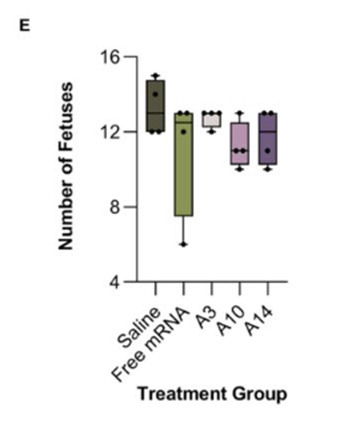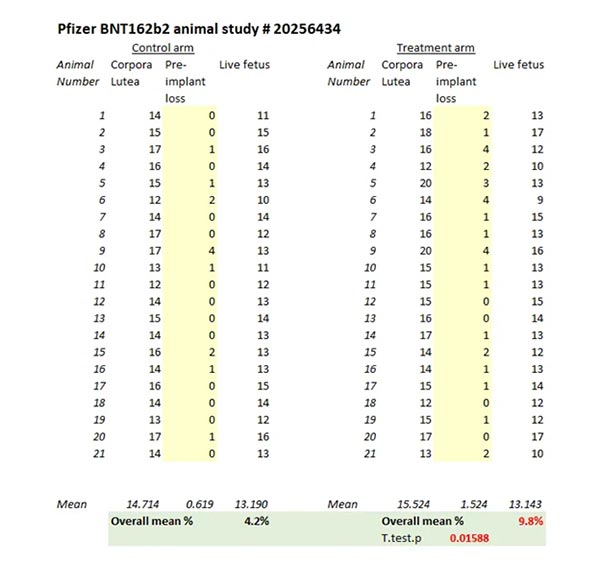While a typical vaccine must undergo 10 to 12 years of trials before it’s released, during the pandemic, COVID-19 shots were made available to the public just 10 months after development, courtesy of an Emergency Use Authorization.1 Even pregnant women were subjected to the shots, and in many cases were mandated to receive them.
“The pushing of these experimental COVID-19 vaccines globally is the greatest violation of medical ethics in the history of medicine, maybe humanity,” Dr. James Thorp, a maternal fetal medicine expert, told Tucker Carlson.2 Thorp and colleagues published a preprint study that found striking risks to pregnant women who received the shots, along with their unborn babies.3
The outcomes were so dire that the researchers concluded pregnant women should not receive COVID-19 shots until further research is completed. “A worldwide moratorium on the use of COVID-19 vaccines in pregnancy is advised until randomized prospective trials document safety in pregnancy and long-term follow-up in offspring,” they explained.4
COVID Shots Linked to 27-Fold Higher Risk of Miscarriage
Thorp and colleagues used data from the U.S. Centers for Disease Control and Prevention’s Vaccine Adverse Events Reporting System (VAERS) to assess adverse events experienced by women of reproductive age following receipt of a COVID-19 shot, compared to receipt of a flu shot. Compared to the flu vaccine, COVID-19 shots were associated with a significant increase in adverse events (AE), including:5
Menstrual abnormality | Miscarriage |
Fetal chromosomal abnormalities | Fetal malformation |
Fetal cystic hygroma | Fetal cardiac disorders |
Fetal arrhythmia | Fetal cardiac arrest |
Fetal vascular malperfusion | Fetal growth abnormalities |
Fetal abnormal surveillance | Fetal placental thrombosis |
Low amniotic fluid | Fetal death/stillbirth |
“When normalized by time-available, doses-given, or persons-received, all COVID-19 vaccine AE far exceed the safety signal on all recognized thresholds … Pregnancy and menstrual abnormalities are significantly more frequent following COVID-19 vaccinations than that of Influenza vaccinations,” the researchers noted.6
Specifically, the data revealed a 27-fold higher risk of miscarriage and a more than twofold increased risk of adverse fetal outcomes across six different categories, according to board-certified internist and cardiologist Dr. Peter McCullough.7
Were Nurses Issued Gag Order Against Speaking Out?
Problems began to appear shortly after COVID-19 shots were rolled out, such that a leaked email from a large California hospital was sent out in warning to 200 nurses. The email, from September 2022, contained the subject line, “Demise Handling,” referring to an increase in stillbirths and fetal deaths. A TCW report by journalist Sally Beck shared the email’s content, which read:8
“It seems as though the increase of demise patients [babies] that we are seeing is going to continue. There were 22 demises [stillbirths and fetal deaths] in August [2022], which ties [equals] the record number of demises in July 2021, and so far in September [2022] there have been 7 and it’s only the 8th day of the month.”
Beck reports that one nurse, Michelle Gershman, who works in the neonatal ward had her bonus withheld because she spoke out about the rise in fetal deaths. “We used to have one fetal demise per month. That rose to one or two per week,” Gershman said. Beck reported:
“Her experience, and the experience of doctors working with pregnant women, is contrary to official ‘safe and effective’ observation and advice, but no one was free to speak out because of a gagging order imposed in September 20219 by the American Board of Obstetrics and Gynecology (ACOG).
… At the beginning of the rollout, in December 2020, pregnant women who were healthcare workers or deemed to be at risk from Covid began receiving the shots. By May 2021, the vaccine was being recommended to all pregnant American women.
This is despite the fact that none of the vaccine manufacturers had completed reproductive toxicology reports in animals, and none had started clinical trials in pregnant women. Two months later, hospitals noticed a huge increase in miscarriage, stillbirth, preterm births, pregnancy complications and menstrual abnormalities.”
COVID-19 Shots Should Be Category X
The mRNA from COVID-19 shots circulates in the body for 28 days or more, and the spike protein may trigger clotting, bleeding and tissue damage, according to McCullough.
Because of this and other concerns, he states that, conservatively, COVID-19 shots should be given the Category X designation during pregnancy,10 which means, “The risk of use of the drug in pregnant women clearly outweighs any possible benefit. The drug is contraindicated in women who are or may become pregnant.”11
Unfortunately, health officials in the U.S. continue to affirm its safety, even for vulnerable populations such as this, as they have from the very beginning. “Shockingly, in the very first week of mass vaccination in December of 2020,” McCullough wrote, “news reels depicted well-intentioned pregnant mothers getting injected with synthetic lipid nanoparticles laced with long-lasting mRNA coding for the Wuhan Institute of Virology Spike protein.”12
Thorp’s study also reported that Pfizer’s data showed COVID-19 shot contents are biodistributed into the bloodstream within hours and cross “all physiologic barriers including the maternal-placental-fetal barrier and the blood brain barriers in both the mother and the fetus.”13
A separate study is, in fact, looking at using ionizable lipid nanoparticles (LPNs) like those used as mRNA delivery platforms in COVID-19 shots, as tools to deliver drugs to the placenta, because they’re so effective at reaching it.
“LNPs enhance mRNA stability, circulation time, cellular uptake and preferential delivery to specific tissues compared to mRNA with no carrier platform,” the researchers wrote.14 But the study contains some concerning data, which was shared on Twitter:15,16

User Jikkyleaks tweeted, “This could be one of the biggest scandals in medicine … Can you see that there are fewer fetuses in all the treatment groups compared to saline? It’s not dramatic, because the authors published that figure instead of the number of fetal losses.”17
Health officials made the recommendation that COVID-19 shots are safe and effective for pregnant women based on a 42-day study from Pfizer involving 44 rats.18 What’s more, the Pfizer-BioNTech rat study revealed the shot more than doubled the incidence of preimplantation loss and also led to a low incidence of mouth/jaw malformations, gastroschisis (a birth defect of the abdominal wall) and abnormalities in the right-sided aortic arch and cervical vertebrae in the fetuses.19

“In that study the fetal loss rate DOUBLED (4.2% to 9.8%) but had little impact on the overall number of fetuses,” Jikkyleaks tweeted, sharing the chart above. “This is how this information is hidden. That single slide should have been enough to prompt much more investigation, because it showed fewer fetuses in EVERY GROUP.”20,21
Shocking Decline in Birth Rates Post-COVID Shots
Birth rates in multiple European countries fell significantly in the end of 2021, months after COVID-19 shots became widely utilized. The data,22 compiled by a team of European researchers, found declines in birth rates in all the countries they studied, including:23
Germany | Austria | Switzerland |
France | Belgium | Netherlands |
Denmark | Estonia | Finland |
Latvia | Lithuania | Sweden |
Portugal | Spain | Czech Republic |
Hungary | Poland | Romania |
Slovenia | Iceland | Northern Ireland |
Montenegro | Serbia |
The team explained:24
“In advance it should be noted that every single examined European country shows a monthly decline in birth rates of up to more than 10% compared to the last three years. It can be shown that this very alarming signal cannot be explained by infections with Covid-19.
However, one can establish a clear temporal correlation to Covid vaccinations incidence in the age group of men and women between 18 and 49 years. Therefore, in-depth statistical and medical analyses have to be demanded.”
The declines in birth rates ranged from a low of 1.3% in France to a high of 19% in Romania. Seven countries had a decline in birth rate of more than 10%, while 15 countries had declines of greater than 4%. Switzerland’s drop was said to have exceeded the drop that occurred from World War I, World War II, the Great Depression and the release of oral contraceptives.25
No connection was found between the declines in birth rates and COVID-19 infections or hospitalizations, with the team noting:26
“Adverse reactions related to the female reproductive organs and study findings related to male fertility point to a causal interpretation of the association of birth declines and the Covid-19 vaccinations.”
COVID Shots Affect Menstrual Cycles
It remains unknown how COVID-19 shots affect reproductive health in men and women. For instance, as The Vaccine Reaction reported, “To date, the manufacturer’s insert for FDA-approved COVID shots explicitly states that it has not been tested for the potential to impair male fertility.” However, data on U.S. infertility after the rollout of COVID shots aren’t available.27
Meanwhile, women around the globe have reported changes in their menstrual cycles following COVID-19 shots, and health officials largely brushed off the reports or labeled them anecdotal.
But a study published in Obstetrics & Gynecology — and funded by the National Institute of Child Health and Human Development (NICHD) and the National Institutes of Health (NIH) Office of Research on Women’s Health — confirms an association between menstrual cycle length and COVID-19 shots.28
Clinical trials for COVID-19 shots did not collect data about menstrual cycles following injection, and VAERS does not actively collect menstrual cycle information either, making it difficult to initially determine whether the shots were having an effect. Anecdotal reports on social media, however, are numerous and, according to the study, “suggest menstrual disturbances are much more common …”29
The Obstetrics & Gynecology study involved 3,959 individuals between the ages of 18 and 45 years. Those who had not received a COVID-19 shot noted no significant changes in cycle 4 during the study compared to their first three cycles.
Those who received COVID-19 shots, however, had longer menstrual cycles, typically by less than one day, when they received the shots. The longer cycles were noted for both doses of the injection, with a 0.71-day increase after the first dose and 0.91-day increase after the second dose.30
Cycle Changes of Eight Days or More Noted
The overall declines were described as not clinically significant. However, some women, particularly those who received two shots in the same menstrual cycle, experienced significant changes, including a two-day increase in cycle length and, in some cases, changes in cycle length of eight days or more. Considering a regular menstrual cycle is “an overt sign of health and fertility,”31 any changes could have major ramifications.
Further, the team noted, “Questions remain about other possible changes in menstrual cycles, such as menstrual symptoms, unscheduled bleeding, and changes in the quality and quantity of menstrual bleeding.”32
Taken together, the links to miscarriage, reproductive changes and declining birth rates raise major red flags about the safety of COVID-19 shots for people of reproductive age. As such, the European research team echoed Thorp in calling for a moratorium on COVID-19 shots for pregnant women, and took it a step further, suggesting a suspension for everyone of reproductive age:33
“Given the considerable individual and social relevance of the link between vaccination campaigns and declining birth rates, the immediate suspension of Covid-19 vaccination for all persons of childbearing and reproductive age should be called for.”
